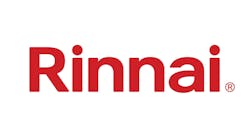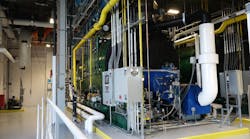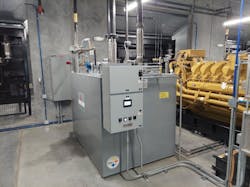Latest from Hydronics
Sponsored
Boiler systems are a critical component for the continuous operation of a facility. Not only do contractors need to minimize their downtime, but they must, simultaneously, maintain safe, reliable, and efficient operations. Unfortunately, there are some sizeable challenges to accomplishing that level of operation.
To start, a boiler system consists of many sub-systems that must work in harmony: the boiler, the burner and its controls, boiler controls including feed water and draft control, fuel oil handling system, water treatment, and potentially things like fuel gas booster systems, too.
Each subsystem may come from a different manufacturer or distributor, with varied levels of service. When these systems are built without a cohesive integration strategy, contractors face compatibility issues, inefficiencies, and increased downtime risks. Additionally, they must struggle to figure out which vendor is responsible when something goes wrong. And the game of pass the buck begins…
Full system integration offers a comprehensive solution, ensuring not only the reliability and efficiency of boiler operations but also a single source of accountability.
Pitfalls of the Multi-Vendor Approach
When a boiler system is built with components from multiple vendors, there is often no coordination to how each component interfaces. This can lead to a disjointed system that is, at its best, inefficient and, at its worst, a safety hazard. Problems can range from inefficient communications between components to critical failures, such as water level control issues which could cause a steam burst; or water treatment failures that reduce the longevity and efficiency of the boiler.
Since boiler systems are sophisticated in nature, they are susceptible to a variety of failures that require specialized knowledge for troubleshooting.
For contractors, these challenges are compounded by the difficulty of pinpointing a root cause. For instance, a low-frequency combustion "rumble" could be caused by 10 different potential causes; anything from burner instability at certain firing rates to improper air/fuel ratios or even the design of the boiler room’s ventilation system. This means a contractor may need representatives from several vendors to assess the problem before even finding the cause, let alone the solution.
The troubleshooting process is even further complicated by the diverging interests of each vendor, none of which wants to take responsibility unless it means service income to them.
Benefits of Full System Integration
Adopting a full system integration approach, where a single provider designs and implements all components of the boiler system, offers clear advantages:
1. Operational Efficiency: Integrated systems are designed to work in harmony, reducing fuel consumption and improving overall system performance.
2. Safety and Reliability: With components designed to work together, the risks of safety issues are minimized, and the system's reliability is enhanced.
3. Cost Savings: Integration simplifies maintenance and troubleshooting, as there’s a single point of contact for all issues. This can lead to significant savings in both time and money for facilities managers.
4. Customization and Compliance: Systems designed for full integration can be tailored to the specific needs of the facility, ensuring compliance with regulatory standards and operational requirements.
To top it all off…the most important outcome of full system integration is single-source accountability
Benefits of Single Source Accountability
There are so many benefits of single-source accountability that it really needs its own list. It is defined as a single provider (in this case, the integrator) being responsible for all aspects of a specific system, taking full responsibility for planning, execution, maintenance, and performance outcomes.
For contractors, this level of accountability in their boiler room leads to:
1. Simplified management: If the burner system does not perform, you have only one vendor to communicate and coordinate with. The integrator is responsible for correcting the problem. This eliminates the incredible hassle of narrowing down the problem with different suppliers and vendors, along with the inevitable blame-shifting that goes with it.
2. Time efficiency: Single-source accountability can lead to faster decision-making and problem solving, minimizing downtime and disruptions.
3. Long-term relationships: A burner system supplier that adopts the full system integration approach is inclined to build a long-term relationship with their customer. Right from the start, the supplier looks more carefully at the specific conditions and requirements of the customer and finds the best solution, tailored to the customer, instead of chasing the latest trendy piece of equipment or specifications.
4. Aligned goals: When there is never a question of who is accountable for fixing a problem, everyone’s goals are aligned—customer, contractor, and integrator all want the most stable, efficient system, with minimal downtime. The integrator wants to design the best system possible, knowing that they will be responsible for any service needs down the road.
5. Streamlined maintenance: With only one provider to coordinate maintenance, preventative practices become easier, leading to improved outcomes and longer equipment lifespan.
6. Better Compliance: Single-source providers are often more organized in maintaining compliance with regulations and keeping detailed documentation, which can simplify audits and inspections.
Making it Hassle-free
Navigating the complexities of boiler room management can be a daunting task for contractors. The number of subsystems and potential for inefficiencies and safety hazards require a robust approach.
Full system integration with single-source accountability presents a powerful solution, streamlining operations, enhancing safety and reliability, and ultimately saving time and money. By embracing a single-source accountability model, contractors can achieve seamless coordination, rapid problem resolution, and long-term, mutually beneficial relationships with their providers.
This not only aligns the goals of all stakeholders but also ensures that boiler systems operate at peak efficiency, offering peace of mind and sustained operational excellence. For contractors aiming for hassle-free boiler room management, single-source accountability is not just an option—it’s a game-changer.
Ruth O'Donnell has been with Preferred Utilities Manufacturing Corporation since 2014 and has been Brand Director since 2017. Ruth is a fourth-generation member of the family-owned and operated business. Known for her strategic leadership, Ruth leads projects that reinforcePreferred Utilities' commitment to energy efficiency and environmental responsibility.Her focus on innovation and sustainability extends past Preferred Utilities and into the Boiler industry at large. She is a member of Women in the Boiler Industry (WIBI) and the American Boiler Manufacturers Association (ABMA), where she actively supports industry advancements and inclusion.
Ruth O'Donnell
Ruth O'Donnell has been withPreferred Utilities Manufacturing Corporation since 2014 and has been Brand Director since 2017. Ruth is a fourth-generation member of the family-owned and operated business. Known for her strategic leadership, Ruth leads projects that reinforcePreferred Utilities' commitment to energy efficiency and environmental responsibility.Her focus on innovation and sustainability extends past Preferred Utilities and into the Boiler industry at large. She is a member of Women in the Boiler Industry (WIBI) and the American Boiler Manufacturers Association (ABMA), where she actively supports industry advancements and inclusion.




